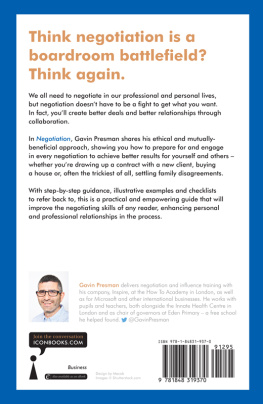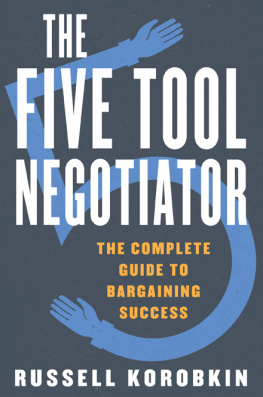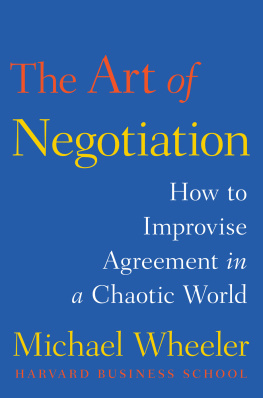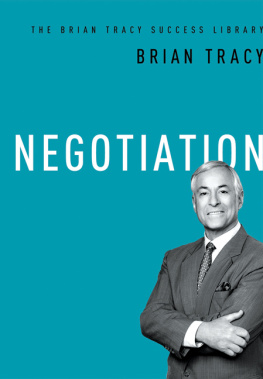
ALSO BY ROBERT MNOOKIN
Beyond Winning: Negotiating to Create Value in Deals and Disputes (with Scott Peppet and Andrew Tulumello)
Negotiating on Behalf of Others (co-edited with Lawrence Susskind)
Barriers to Conflict Resolution (co-edited with Kenneth J. Arrow, Lee Ross, Amos Tversky, and Robert Wilson)
Dividing the Child: Social and Legal Dilemmas of Custody (with Eleanor Maccoby)
BARGAINING WITH
THE DEVIL

When to
NEGOTIATE,
When to
FIGHT

ROBERT MNOOKIN


Simon & Schuster
1230 Avenue of the Americas
New York, NY 10020
www.SimonandSchuster.com
Copyright 2010 by Robert H. Mnookin
All rights reserved, including the right to reproduce this book or
portions thereof in any form whatsoever. For information address
Simon & Schuster Subsidiary Rights Department,
1230 Avenue of the Americas, New York, NY 10020
First Simon & Schuster hardcover edition February 2010
SIMON & SCHUSTER and colophon are registered trademarks of Simon & Schuster, Inc.
For information about special discounts for bulk purchases,
please contact Simon & Schuster Special Sales at
1-866-506-1949 or business@simonandschuster.com.
The Simon & Schuster Speakers Bureau can bring authors to your live event. For more information or to book an event, contact the Simon & Schuster Speakers Bureau at
1-866-248-3049 or visit our website at www.simonspeakers.com.
Design by Level C
Manufactured in the United States of America
10 9 8 7 6 5 4 3 2 1
Library of Congress Cataloging-in-Publication Data
Mnookin, Robert
Bargaining with the devil : when to negotiate, when to fight / Robert Mnookin.
p. cm.
1. Negotiation. 2. Conflict management. 3. Negotiation in business. I. Title.
BF637.N4M58 2010
302.3dc22 2009048661
ISBN 978-1-4165-8332-5
ISBN 978-1-4165-8364-6 (ebook)
For my four little devilsEli, Hailey, Isaac, and Sophia
Contents
BARGAINING WITH
THE DEVIL
Introduction
Should you bargain with the Devil?
In an age of terror, our national leaders face this sort of question every day. Should we negotiate with the Taliban? Iran? North Korea? What about terrorist groups holding hostages?
In private disputes, you may face devils of your own. A business partner has betrayed you and now wants to negotiate a better deal. A marriage is ending and a divorcing spouse is making extortionist demands. A competitor has stolen your intellectual property. You are furious. Your gut tells you to fight it out in court. To negotiate with this person would give him something he wants . It would reward him for his bad behavior. You want your rights vindicated, and the thought of negotiating with your adversary seems wrong.
This book is about these kinds of conflicts, which pose some of the most challenging questions in negotiation. A disputant must decide: Should I bargain with the Devil, or resist? By bargain I mean attempt to make a dealtry to resolve the conflict through negotiationrather than fighting it out. By Devil, I mean an enemy who has intentionally harmed you in the past or appears willing to harm you in the future. Someone you dont trust. An adversary whose behavior you may even see as evil.
These days it is not fashionable to talk about evil, particularly among professionals concerned with dispute resolution. It smacks of smug moralism and religious fundamentalism. It has religious overtones connected with notions of sin. Moreover, many dispute resolution professionals would argue that it has no stable definition or inherent meaning. Many believe that the concept is entirely subjective: an individual who is involved in a conflict will often perceive the adversary as evil, but it is only a perception; a detached observer might disagree. Others would add that the notion of what is evil can vary greatly depending on time and place. This is not simply an academic debate about definitions. In my field, an air of taboo hangs around the word evil. It is considered a slippery and explosive term, much overused, loosely deployed, and too often exploited by religious and political leaders to malign their enemies and lead their followers into battle.
While I agree that these dangers exist and demonization can get in the way of clear thinking, I do not believe that the concept of evil is incoherent or meaningless. In my view, intentionally inflicting grievous harm on human beings without a compelling justification is evil. The Nazis persecution of the Jews, the Hutus slaughter of the Tutsi, and the Talibans penchant for throwing acid in the face of girls who dare to go to schoolall of these are evil acts. So were the attacks of September 11, 2001, when suicidal terrorists intentionally and without justification killed nearly three thousand innocent civilians.
My question, and this book, have their roots in September 11. In the fall of 2001, less than a month after the attacks, Harvard Law Schools Program on Negotiation sponsored a public debate at Harvard on whether President Bush should be prepared to negotiate with the Taliban. This debate led me to begin thinking about a more general question: In any particular conflict, how should you decide whether or not it makes sense to negotiate?
At the time of our debate, events were moving quickly. Bush had just issued an ultimatum to the Taliban government in Afghanistan: Shut down al-Qaedas training camps and turn over Osama bin Laden and his lieutenants, or we will invade.
The Taliban, surprisingly, had responded by inviting President Bush to negotiate. In addressing a council of clerics on September 19, the Taliban leader Mullah Mohammed Omar said, If the American government has some problems with the Islamic Emirate of Afghanistan, they should be solved through negotiations (emphasis added).
My colleague Roger Fisher and I were invited to discuss how Bush should respond to this offer. Roger Fisher is probably the best-known negotiation guru in the world. He is the leading proponent of what is called interest-based or win-win negotiation. His seminal book, Getting to Yes , has sold over three million copies. I am his successor as chair of Harvards Program on Negotiation.
Roger and I share common views on many important issues.
But not in this case.
Roger took the positionas I knew he wouldthat President Bush was wrong to issue an ultimatum and that the United States should accept the Talibans invitation to negotiate. His argument was consistent with his view, expressed in many of his books, that one should always try to resolve conflict through a problem-solving approach to negotiation based on the interests of the parties.
Essentially, Roger supports the categorical notionprevalent in the field of dispute resolutionthat you should always be willing to negotiate.
The core argument behind this notion is straightforward and appealing. Before you resort to coercive measuressuch as warfare or litigationyou should try to resolve the problem. To negotiate doesnt mean you must give up all that is important to you. It only requires that you be willing to sit down with your adversary and see whether you can make a deal that serves your interests better than your best alternative does. People and regimes are capable of change. You cant hope to make peace with your enemies unless you are willing to negotiate.
Next page











